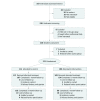Effect of MyTeen SMS-Based Mobile Intervention for Parents of Adolescents: A Randomized Clinical Trial
- PMID: 31509210
- PMCID: PMC6739724
- DOI: 10.1001/jamanetworkopen.2019.11120
Effect of MyTeen SMS-Based Mobile Intervention for Parents of Adolescents: A Randomized Clinical Trial
Abstract
Importance: There is global pressure to respond to the burden posed by adolescent mental health problems. The National Mental Health Commission has made a call for investment in mobile health services directed at prevention and early intervention to relieve the demand on targeted mental health services that are costly to provide. Parents and primary caregivers play a significant role in the lives of adolescents and are important targets for such efforts. Currently, there is no evidence for the effectiveness of programs delivered solely via text message for parents of adolescents.
Objective: To evaluate the effects of a text-messaging program (MyTeen) on promoting parental competence and mental health literacy for parents of adolescents.
Design, setting, and participants: A parallel 2-group randomized clinical trial was conducted in New Zealand. A total of 221 parents and primary caregivers of adolescents aged 10 to 15 years were recruited from March 19 to August 17, 2018, via community outreach and social media and were randomly allocated 1:1 into the control or the intervention group. Statistical analysis was performed on the principle of intention to treat with adjustment for baseline factors and ethnicity.
Intervention: A text-messaging program for parents of adolescents (age 10-15 years) to promote parental competence and mental health literacy. Participants received 1 daily text message over 4 weeks.
Main outcomes and measures: Parental competence, assessed at 1 month after randomization by the Parenting Sense of Competence Scale.
Results: In total, 221 participants (214 [96.8%] female) were randomized, 109 to the intervention group and 112 to the control group; 201 participants (91%) completed the trial at 3 months. Significant group difference was observed on the primary outcome at the end of 1 month of intervention, with participants reporting a higher level of parental competence than those in the control group (estimated mean difference, 3.33 points; 95% CI, 1.37-5.29 points; P = .002). Except for knowledge about mental health, all secondary outcomes were significant, including continued improvement in parental competence at 3 months (estimated mean difference, 4.08 points; 95% CI, 1.96-6.20 points; P < .001), knowledge of help seeking (estimated mean difference, 0.99 points; 95% CI, 0.49-1.50 points; P < .001), parental distress (estimated mean difference, -2.39 points; 95% CI, -4.37 to -0.40 points; P = .02), and parent-adolescent communication (estimated mean difference, 2.21 points; 95% CI, 0.48-3.95 points; P = .01), with participants in the intervention group reporting better parenting-related outcomes than the control group at 1 and 3 months after the intervention.
Conclusions and relevance: This text-messaging program for parents of adolescents appears to be an effective and feasible way to facilitate the implementation and delivery of evidence-based information to populations that are not easily reached with other intervention modalities. The program can be easily scaled up for delivery as an early preventive intervention and may represent a less expensive option for service delivery.
Trial registration: anzctr.org.au Identifier: ACTRN12618000117213.
Conflict of interest statement
Figures
Similar articles
-
Evaluation of MyTeen - a SMS-based mobile intervention for parents of adolescents: a randomised controlled trial protocol.BMC Public Health. 2018 Oct 26;18(1):1203. doi: 10.1186/s12889-018-6132-z. BMC Public Health. 2018. PMID: 30367613 Free PMC article. Clinical Trial.
-
Development of MyTeen Text Messaging Program to Support Parents of Adolescents: Qualitative Study.JMIR Mhealth Uhealth. 2019 Nov 20;7(11):e15664. doi: 10.2196/15664. JMIR Mhealth Uhealth. 2019. PMID: 31746767 Free PMC article.
-
A Brief Home-Based Parenting Intervention to Reduce Behavior Problems in Young Children: A Pragmatic Randomized Clinical Trial.JAMA Pediatr. 2021 Jun 1;175(6):567-576. doi: 10.1001/jamapediatrics.2020.6834. JAMA Pediatr. 2021. PMID: 33720329 Free PMC article. Clinical Trial.
-
The Use of Noncommercial Parent-Focused mHealth Interventions for Behavioral Problems in Youth: Systematic Review.JMIR Mhealth Uhealth. 2024 Sep 24;12:e51273. doi: 10.2196/51273. JMIR Mhealth Uhealth. 2024. PMID: 39316435 Free PMC article.
-
Does a Stress Management Program for African American Parents Increase Asthma Symptom–Free Days for Their Children? The BEAMS Study [Internet].Washington (DC): Patient-Centered Outcomes Research Institute (PCORI); 2020 Apr. Washington (DC): Patient-Centered Outcomes Research Institute (PCORI); 2020 Apr. PMID: 40043157 Free Books & Documents. Review.
Cited by
-
A survey of mental health literacy in parents and guardians of teenagers.Front Psychiatry. 2024 Feb 9;15:1295918. doi: 10.3389/fpsyt.2024.1295918. eCollection 2024. Front Psychiatry. 2024. PMID: 38404469 Free PMC article.
-
A pilot randomized control trial on the feasibility, acceptability, and initial effects of a digital-assisted parenting intervention for promoting mental health in Malaysian adolescents.Digit Health. 2024 Apr 24;10:20552076241249572. doi: 10.1177/20552076241249572. eCollection 2024 Jan-Dec. Digit Health. 2024. PMID: 38665881 Free PMC article.
-
Retention and engagement of rural caregivers of adolescents in a short message service intervention to reduce sugar-sweetened beverage intake.Digit Health. 2023 Mar 16;9:20552076231160324. doi: 10.1177/20552076231160324. eCollection 2023 Jan-Dec. Digit Health. 2023. PMID: 36949896 Free PMC article.
-
Advance care planning for adolescents with cancer and their parents: study protocol of the BOOST pACP multi-centre randomised controlled trial and process evaluation.BMC Pediatr. 2021 Sep 1;21(1):376. doi: 10.1186/s12887-021-02841-7. BMC Pediatr. 2021. PMID: 34470598 Free PMC article.
-
Online positive parenting programme for promoting parenting competencies and skills: randomised controlled trial.Sci Rep. 2022 Apr 19;12(1):6420. doi: 10.1038/s41598-022-10193-0. Sci Rep. 2022. Retraction in: Sci Rep. 2024 Jul 15;14(1):16244. doi: 10.1038/s41598-024-66589-7. PMID: 35440798 Free PMC article. Retracted. Clinical Trial.
References
-
- Clark T, Fleming T, Bullen P, et al. Youth'12 prevalence tables: the health and wellbeing of New Zealand secondary school students in 2012. https://www.fmhs.auckland.ac.nz/assets/fmhs/faculty/ahrg/docs/Prevalence.... Accessed February 15, 2019.
Publication types
MeSH terms
Associated data
LinkOut - more resources
Full Text Sources
Medical
Miscellaneous


